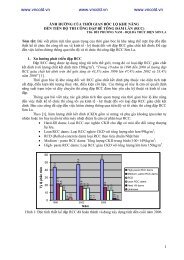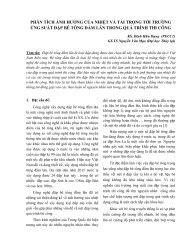Civil Engineering Project Management (4th Edition)
You also want an ePaper? Increase the reach of your titles
YUMPU automatically turns print PDFs into web optimized ePapers that Google loves.
74 <strong>Civil</strong> <strong>Engineering</strong> <strong>Project</strong> <strong>Management</strong><br />
setting up, etc.; another may spread the cost of such items over all his unit rates<br />
entering only a few, relatively small sums in the Preliminaries Bill. Differences<br />
in rates can also arise from different materials or methods used, different appreciation<br />
of risk, and sometimes from simple error.<br />
If the lowest tender appears impracticably low, the employer may agree that<br />
the engineer should interview the tenderer in the hope of elucidating whether<br />
this results from the tenderer’s inexperience, over-optimism, or misunderstanding<br />
of the contract requirements. However, such a meeting can prove uninformative<br />
leaving the problem still open as to whether such a tender should be<br />
accepted. Acceptance of a tender which would put the contractor to a certain<br />
loss can lead to skimped work or the contractor failing to complete the works. To<br />
allow the tenderer to adjust his faulty price would not be permissible for a<br />
public authority but he can be allowed to withdraw his offer. However, a private<br />
employer is not precluded from bargaining with a tenderer to settle an adjusted<br />
price, or to agree upon some other solution such as offering a bonus to make up<br />
the underpriced item if the contractor completes the works early.<br />
The chances of receiving an unrealistically low tender can be minimized by<br />
avoiding open tendering and giving selected pre-qualified tenderers adequate<br />
time to prepare bids. Before tenders are received the engineer can estimate what<br />
a fair bid price should be. However, under fiercely competitive conditions lower<br />
bids may be received; or if there is much work available or the risks imposed<br />
on the contractor are high, bids can come much higher than expected. If a<br />
contractor expects he will meet administrative problems, difficulty in getting<br />
permits, payments, materials, consents, etc. and suffer from indecision or overcomplicated<br />
authorizing systems run by the employer, he will add a premium<br />
to his prices. It must be realized that contractors pay as much attention to the<br />
competence of employers, as employers pay to the competence of contractors.<br />
A further matter to be examined is the effect of a tenderer’s pricing on the<br />
rate of payments to him during construction, that is, on the cash flow. A contractor<br />
may set his rates for early work high, such as rates for excavation and<br />
foundation concrete. Thus these, containing a large element of profit to him,<br />
will provide him with a good inflow of surplus cash at an early stage in the project.<br />
Similarly he may enter high prices in the Preliminaries Bill for early temporary<br />
works, such as provisions of offices, etc. This pricing is of considerable<br />
financial benefit to a contractor, quickly reducing his start-up costs and borrowing<br />
needs; but it is also a dis-benefit to the employer who, often needing<br />
to borrow money to finance the capital expenditure on the project, has to pay<br />
interest thereon. Comparison of the rates of cash flow implied by different tenders<br />
may therefore need to be made to see their different financial effect on the<br />
employer. If the interest on a employer’s borrowings is capitalized, that is, not<br />
paid when due but added to his borrowings, this can magnify the effect of early<br />
cash disbursement on the employer’s costs, increasing the capital cost of the<br />
project to him. A further point is that a contractor who receives early money<br />
leaves the employer at extra risk, because if the contractor gets into financial<br />
difficulties, much of the early money may not have been spent on permanent<br />
works of value to the employer.


















